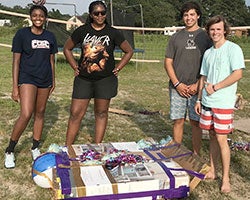Resources
ECU and its partners provide a number of research and development resources for RISE29 student teams. RISE29 will utilize on-campus resources at ECU, financial resources from both the university and its community partners, and business resource expertise from industry leaders.
On-Campus Community Resources

ECU provides on-campus community resources toward RISE29, including its premier entrepreneurship living learning community.
- Horizon Living Learning Community The Horizon LLC is an interdisciplinary, collaborative living learning environment where students explore opportunities to develop creative, innovative and entrepreneurial responses to community issues. Students from across campus are introduced to entrepreneurship practice and theory during their four years at ECU, eventually completing the Miller School of Entrepreneurship’s certificate program.
On-Campus Facilities

ECU provides on-campus facilities allowing RISE29 student teams to develop their business models or technological innovations.
- Economic Growth Collaboratory: ECU’s Economic Growth Collaboratory harnesses the power of big data and analytics, using impactful data visualizations to provide guidance in business development and planning. The collaboratory will play a key role in finding meaningful pathways toward economic growth in eastern North Carolina.
- Van and Jennifer Isley Innovation Building: In development, the Isley Innovation Building provides space for business, engineering, technology and art studies to collaborate on product innovation and entrepreneurship. The space will house a world-class, rapid-prototype fabrication workshop.
- Innovation Design Lab: The Innovation Design Lab is a collaborative venue for leading edge research and design-driven innovation. The lab was named a 2016 Awards of Excellence finalist by the University Economic Development Association for its 3D printers, rapid prototyping, animation design technology, and motion capture technology.
- Multi-Campus Research Labs: ECU’s research labs spread across the state, from its main and health sciences campus in Greenville to its Outer Banks Campus on Roanoke Island. The university has invested $100 million in research facilities upgrades, including its future Life Sciences and Biotechnology Building and Research Greenhouse.
Educational Resources

ECU provides educational opportunities for students participating in RISE29. These opportunities range from traditional classroom courses to internships.
- E-Passport Program: RISE29 students will participate in ECU’s newly developed Entrepreneurial Passport program (E-Passport). The program tracks students interactions with ECU entrepreneurial activities, seminars and facilities, including Miller School of Entrepreneurship courses, the Gene T. Aman Pirate Challenge, NSF I-Corps@ECU, ECU Hult Prize, Innovation Design Lab workshops, and more.
- Internships: During their four years at ECU, RISE29 participants will take part in internships approved by the program. These internships offer students real-world experience that may draw on their entrepreneurial knowledge. RISE29 interns will be paired with community partners across the program’s four-county region.
Business Resources

Complimenting ECU’s educational resources, the university will provide business resources that help develop new small businesses.
- Office of Innovation and New Ventures: The Office of Innovation and New Ventures spurs social and economic growth by using new innovations and discoveries to create valuable products, processes and services for the benefit of the region. The office can pair entrepreneurs with existing ECU technology, faculty connections, and innovation spaces.
- Office of Commercialization and Licensing: Part of the Office of Innovation and New Ventures, ECU’s Office of Commercialization and Licensing has the experience and expertise to help students and community partners realize the potential for newly developed technologies and innovations. The office helps with commercialization plans, patenting and licensing deals.
- Office of Community Engagement and Research: ECU’s Office of Community Engagement and Research offers entrepreneurs connections to community leaders. The office establishes and facilities relationships between the university and its regional partners, helping communities pair their needs with university researchers and entrepreneurs.
- ECU Small Business and Technology Development Center: The SBTDC at East Carolina University helps small and mid-sized businesses in the region by offering general services, including business and management advice, financial analysis, research, and marketing assistance, to targeted services like government procurement, international business and exporting, and growth services.
- ECU Legal: ECU’s Office of University Counsel provides assistance with contract negotiations and intellectual property and technology claims. The office can help with copyright claims, patents and licensing claims, and intellectual property claims.
Off-Campus Facilities

- East Carolina Research and Innovation Campus: The East Carolina Research and Innovation Campus – designated a millennial campus by the UNC System – brings together the university and private businesses to accelerate and expand collaborative research, health sciences, teaching, and service to maximize students success, serve the public, and lead regional transformation. The campus currently includes more than 500 acres with six sites, including our future Life Sciences and Biotechnology Building, Export Leaf Innovation and Economic Development Hub, and Research Greenhouse.
- Community Partners: ECU’s community partners are an important component of the RISE29 program. Our community partners help us identify key needs in the region so that our research and business development ideas play a key role in regional transformation across ECU’s 29 county service region. Regional partners provide historical and community expertise alongside regional assets and infrastructure including human capital, facilities, funding, and existing programming.
- Industry and Government Partners: Likewise, ECU’s industry and government partners are essential to RISE29. These partners provide mentor support for young entrepreneurs and work with student teams to examine microenterprise feasibility. They partners may lead seminars that better educate and prepare RISE29 student participants when it comes time to launch their business ideas.
Financial Resources

- Golden LEAF Grant: In February 2019, the Golden LEAF Foundation provided ECU with a $1 million grant supporting RISE29. The three-year award allowed the university to begin implementing the program in North Carolina along with its county partners.
- ECU Venture Fund: ECU is in the process of creating a for-profit venture fund. This fund will provide seed and early-stage capital for high-growth, early-exit startups related to ECU. The fund will also be able to syndicate deals with other investment groups, angel funds, venture firms, and corporate venture groups.
- Gene T. Aman Pirate Challenge: The Pirate Entrepreneurship Challenge is the Miller School’s premiere business pitch competition. The challenge is open to all teams that have at least one enrolled ECU student. The event features three rounds and during its first two years has awarded more than $120,000 in cash and in-kind services to challenge participants.
- Community Partner Funding and Incentives: One of the most impactful benefits for RISE29 entrepreneurs is the relationship they build with the program’s community partners. Our partnering counties are providing human capital, including former business leaders, business advisory board members, and current business owners, as well as startup capital through grants, business competitions, and loans to help support RISE29 microbusinesses.
